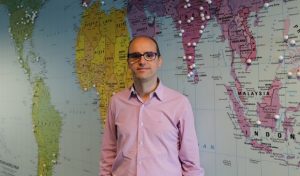 Dr Salinas is a health geographer. He is Associate Professor of Quantitative Methods at Universidad Loyola Andalucía, Spain; and Research fellow at the ANU College of Health and Medicine. He developed his PhD on Spatial Data Analysis through a Multi-Objective Evolutionary Algorithm applied on mental health data. His main area of interest is the relationships between health and territory. He has applied GIS in social and health studies, service maps and spatial data analysis in health ecosystems research in Europe, America and Australia.
Dr Salinas is a health geographer. He is Associate Professor of Quantitative Methods at Universidad Loyola Andalucía, Spain; and Research fellow at the ANU College of Health and Medicine. He developed his PhD on Spatial Data Analysis through a Multi-Objective Evolutionary Algorithm applied on mental health data. His main area of interest is the relationships between health and territory. He has applied GIS in social and health studies, service maps and spatial data analysis in health ecosystems research in Europe, America and Australia.
Dr. Nasser Bagheri
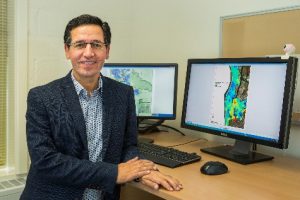 Dr. Nasser Bagheri is a Senior Research Fellow at the Australian National University (ANU), recipient of an Australian Research Council DECRA Fellowship and leads a spatial epidemiology team and co-leads Visualisation and Decision Analytics (VIDEA) lab in the Centre for Mental Health Research. His research has focused on chronic disease risk assessment, particularly, cardiovascular disease (CVD), diabetes, mental health and dementia with a particular interest in spatial variation and quantifying the impact of modifiable risk factors including lifestyle and built environment on chronic disease.
Dr. Nasser Bagheri is a Senior Research Fellow at the Australian National University (ANU), recipient of an Australian Research Council DECRA Fellowship and leads a spatial epidemiology team and co-leads Visualisation and Decision Analytics (VIDEA) lab in the Centre for Mental Health Research. His research has focused on chronic disease risk assessment, particularly, cardiovascular disease (CVD), diabetes, mental health and dementia with a particular interest in spatial variation and quantifying the impact of modifiable risk factors including lifestyle and built environment on chronic disease.
Mr. Manuel Cacho
 Mr. Manuel Cacho Quesada is the Spanish Ambassador in Canberra. He graduated in Law and in the Diplomacy School in Madrid. Between 1977 and 1995 he was assigned to diplomatic missions in the Democratic Republic of Congo, Chile, UK, and Israel. In 2005 he was appointed director general and speaker of Diplomatic Information Office at the Ministry of Foreign Affairs. Previously Mr Cacho has been the Spanish Ambassador in Nigeria, Siria and Cuba. In 2012 he was appointed General Secretary of the Foundation Asia-Pacific. In 2013 he was the head of the special mission for the candidancy of Spain to be a non-permanent member of the UN Security Council (UNSC) (2015-2016).
Mr. Manuel Cacho Quesada is the Spanish Ambassador in Canberra. He graduated in Law and in the Diplomacy School in Madrid. Between 1977 and 1995 he was assigned to diplomatic missions in the Democratic Republic of Congo, Chile, UK, and Israel. In 2005 he was appointed director general and speaker of Diplomatic Information Office at the Ministry of Foreign Affairs. Previously Mr Cacho has been the Spanish Ambassador in Nigeria, Siria and Cuba. In 2012 he was appointed General Secretary of the Foundation Asia-Pacific. In 2013 he was the head of the special mission for the candidancy of Spain to be a non-permanent member of the UN Security Council (UNSC) (2015-2016).
Dr. Sergio Leon-Saval
 Dr Sergio G. Leon-Saval is the Director of the Sydney Astrophotonic Instrumentation Laboratory (SAIL) at the University of Sydney and the president of the association of Spanish Researchers in Australia-Pacific (SRAP). He was awarded his PhD by the University of Bath, UK, in 2006. In October 2007 he joined the Optical Fibre Technology Centre (OFTC) in Sydney, Australia. In 2009, he moved to the University of Sydney, Australia where he is currently part of the Institute of Photonics and Optical Science (IPOS) Executive Committee; Senior Member of the Sydney Institute for Astronomy (SIfA); a Faculty Member of the School of Physics; and Director of the Sydney Astrophotonics Instrumentation Laboratory (SAIL). Dr Leon-Saval has more than 12 years of experience in the research area of photonics, optical devices and Astrophotonics –astronomical instrumentation using photonics. Dr Leon-Saval has co-authored over 70 international refereed journals and more than 110 conference papers since 2004 with over 4532 citations, and a h-index of 35. He is a reviewer and editor for several international technical programme committees (TPC); and a member of international organisations such as the Optical American Society (Senior Member), IEEE, and the Optical Australian Society. Dr Leon-Saval works in photonics, optical fibre devices and astronomical/space instrumentation. His major expertise is on optical fibre transitions for device applications. More recently his research has been focused on the development of photonic new concepts for astronomical instrumentation and spectroscopy, telecommunications and remote sensing for the farming industry.
Dr Sergio G. Leon-Saval is the Director of the Sydney Astrophotonic Instrumentation Laboratory (SAIL) at the University of Sydney and the president of the association of Spanish Researchers in Australia-Pacific (SRAP). He was awarded his PhD by the University of Bath, UK, in 2006. In October 2007 he joined the Optical Fibre Technology Centre (OFTC) in Sydney, Australia. In 2009, he moved to the University of Sydney, Australia where he is currently part of the Institute of Photonics and Optical Science (IPOS) Executive Committee; Senior Member of the Sydney Institute for Astronomy (SIfA); a Faculty Member of the School of Physics; and Director of the Sydney Astrophotonics Instrumentation Laboratory (SAIL). Dr Leon-Saval has more than 12 years of experience in the research area of photonics, optical devices and Astrophotonics –astronomical instrumentation using photonics. Dr Leon-Saval has co-authored over 70 international refereed journals and more than 110 conference papers since 2004 with over 4532 citations, and a h-index of 35. He is a reviewer and editor for several international technical programme committees (TPC); and a member of international organisations such as the Optical American Society (Senior Member), IEEE, and the Optical Australian Society. Dr Leon-Saval works in photonics, optical fibre devices and astronomical/space instrumentation. His major expertise is on optical fibre transitions for device applications. More recently his research has been focused on the development of photonic new concepts for astronomical instrumentation and spectroscopy, telecommunications and remote sensing for the farming industry.
Prof. Jane Dahlstrom
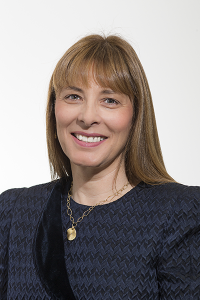 Prof. Jane Dahlstrom is Acting Dean of the College of Health and Medicine at the Australian National University (ANU) and also Professor of Pathology at ANU Medical School. She is a Senior Staff Specialist at ACT Pathology, The Canberra Hospital where she is in charge of the immunohistochemistry laboratory. Jane was born and raised in Sydney Australia. She is a medical graduate of Sydney University. After completing her PhD at the John Curtin School of Medical Research at the ANU she entered speciality training in Anatomical Pathology. She is a Fellow of the Royal College of Pathologists of Australasia (RCPA) in Anatomical Pathology, Oral Pathology and is a founding Fellow of the Faculty of Science of her College. Jane is an active researcher with particular interests in immunohistochemistry, placental, breast and oral pathology.
Prof. Jane Dahlstrom is Acting Dean of the College of Health and Medicine at the Australian National University (ANU) and also Professor of Pathology at ANU Medical School. She is a Senior Staff Specialist at ACT Pathology, The Canberra Hospital where she is in charge of the immunohistochemistry laboratory. Jane was born and raised in Sydney Australia. She is a medical graduate of Sydney University. After completing her PhD at the John Curtin School of Medical Research at the ANU she entered speciality training in Anatomical Pathology. She is a Fellow of the Royal College of Pathologists of Australasia (RCPA) in Anatomical Pathology, Oral Pathology and is a founding Fellow of the Faculty of Science of her College. Jane is an active researcher with particular interests in immunohistochemistry, placental, breast and oral pathology.
A/Prof. Vladimir Canudas
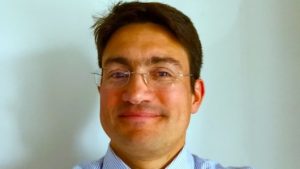 Vladimir Canudas is Associate Professor at the School of Demography, ANU. He studied actuarial science/mathematics and population studies, which triggered his interest on formal demography. Mortality and longevity are at the core of his research. He has previously worked at the Max-Planck Institute in Germany and the University of Groningen in the Netherlands, the University of California, Berkeley, the Pennsylvania State University in USA, and he has been Associate Professor at Johns Hopkins Bloomberg School of Public Health in USA, the Max Planck Odense Center, at the University of Southern Denmark.. At the Max Planck Odense Center he coordinated a group on new and alternative ways of mortality forecasting. He has advised UN, WHO and World Bank panels as well as insurance companies, and serves as active member of demographic societies: PAA, EAPS, and IUSSP.
Vladimir Canudas is Associate Professor at the School of Demography, ANU. He studied actuarial science/mathematics and population studies, which triggered his interest on formal demography. Mortality and longevity are at the core of his research. He has previously worked at the Max-Planck Institute in Germany and the University of Groningen in the Netherlands, the University of California, Berkeley, the Pennsylvania State University in USA, and he has been Associate Professor at Johns Hopkins Bloomberg School of Public Health in USA, the Max Planck Odense Center, at the University of Southern Denmark.. At the Max Planck Odense Center he coordinated a group on new and alternative ways of mortality forecasting. He has advised UN, WHO and World Bank panels as well as insurance companies, and serves as active member of demographic societies: PAA, EAPS, and IUSSP.
A/Prof. Mar Racionero
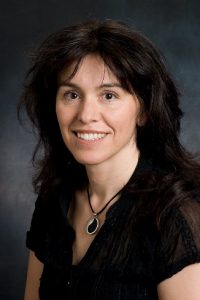 Mar Racionero is Associate Professor, ANU Research School of Economics, and Associate Dean (HDR), ANU College of Business and Economics. She is a member of the association of Spanish Researchers in Australia-Pacific. Dr. Racionero obtained the First National Prize, awarded by the Spanish Ministry of Education, upon completion of her undergraduate studies. She pursued her doctoral studies at the Universitat Autonoma de Barcelona, within the IDEA program (International Doctorate in Economic Analysis), where she obtained both a Master and a Ph D degrees in Economics. From 1997 she benefited from a TMR European Community grant to conduct research at CORE (Universite Catholique de Louvain, Belgium). Her main field of research is public economic theory, with particular interest in optimal taxation theory, and her work has been published in refereed international journals (Canadian Journal of Economics, European Economic Review, European Journal of Political Economy, Journal of Public Economic Theory, Oxford Economic Papers and International Tax and Public Finance).
Mar Racionero is Associate Professor, ANU Research School of Economics, and Associate Dean (HDR), ANU College of Business and Economics. She is a member of the association of Spanish Researchers in Australia-Pacific. Dr. Racionero obtained the First National Prize, awarded by the Spanish Ministry of Education, upon completion of her undergraduate studies. She pursued her doctoral studies at the Universitat Autonoma de Barcelona, within the IDEA program (International Doctorate in Economic Analysis), where she obtained both a Master and a Ph D degrees in Economics. From 1997 she benefited from a TMR European Community grant to conduct research at CORE (Universite Catholique de Louvain, Belgium). Her main field of research is public economic theory, with particular interest in optimal taxation theory, and her work has been published in refereed international journals (Canadian Journal of Economics, European Economic Review, European Journal of Political Economy, Journal of Public Economic Theory, Oxford Economic Papers and International Tax and Public Finance).
Mr. Eladio Hernando
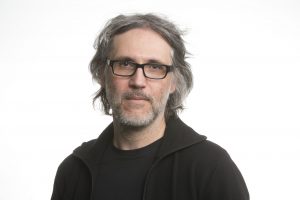 Landscape Architect and Urban Designer. Former member of the Madrid Working Group of the Spanish Association of Landscapers. He works at Spackman Mossop Michaels. SMM was recognised at the 2017 International Federation of Landscape Architects Asia-Pac awards Gala Ceremony in Bangkok, held on the 4th of November. Their recent project Bowen Place Crossing was awarded the top prize for ‘Excellence for Infrastructure’. The project has already secured multiple design awards.
Landscape Architect and Urban Designer. Former member of the Madrid Working Group of the Spanish Association of Landscapers. He works at Spackman Mossop Michaels. SMM was recognised at the 2017 International Federation of Landscape Architects Asia-Pac awards Gala Ceremony in Bangkok, held on the 4th of November. Their recent project Bowen Place Crossing was awarded the top prize for ‘Excellence for Infrastructure’. The project has already secured multiple design awards.
Ms. Janet Laurence
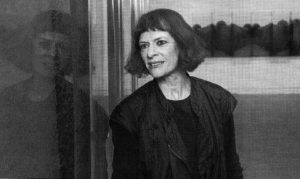 Janet Laurence is renowned as one of Australia’s leading contemporary artists. A recipient of both a Rockefeller and Churchill Fellowship, she was a Trustee of the Art Gallery of NSW, on the VAB Board of the Australia Council, and visiting fellow of the 2016/2017 Hanse-WissenschaftKolleg (HWK) foundation fellowship. Janet Laurence is well known for her public artworks and site-specific installations that extend from the museum and gallery into the urban and landscape domain. Recent significant projects and commissions include: a commission with The Australian Tapestry Workshop, Melbourne (2017); an installation for The Pleasure of Love, October Salon, Belgrade (2016); Deep Breathing: Resuscitation for the Reef, for the Paris Climate Change Conference (2015) and the Paris International Contemporary Art Fair (2015), followed up by the installation Deep Breathing at the Australian Museum, Sydney (2016); Tarkine for a World in Need of Wilderness, Macquarie Bank Foyer, London (2011). Janet also exhibits widely in major art institutions and museums, including Australia, Japan, Germany, Denmark, Hong Kong and the UK. Recent exhibitions include: The Matter of the Masters, Art Gallery of New South Wales (2018); Inside the Flower, IGA Berlin, Germany (2017); Force of Nature II, curated by James Putnam, The Art Pavilion, London (2017); the 13th Cuenca Biennial, Ecuador (2016); Deep Breathing: Resuscitation for the Reef, Muséum National D’Histoire Naturelle, Paris, (2015). Her groundbreaking practice explores issues of the natural world and addresses our relationship to nature. Across photography, sculpture, video and installation, Laurence creates visually immersive environments to reflect on the mutability of nature, science, memory and loss. She has delved increasingly further into this fascination with the interconnection of life forms and ecologies to produce work driven by themes of alchemical transformation, history and perception that is distinctive, complex and beautiful.
Janet Laurence is renowned as one of Australia’s leading contemporary artists. A recipient of both a Rockefeller and Churchill Fellowship, she was a Trustee of the Art Gallery of NSW, on the VAB Board of the Australia Council, and visiting fellow of the 2016/2017 Hanse-WissenschaftKolleg (HWK) foundation fellowship. Janet Laurence is well known for her public artworks and site-specific installations that extend from the museum and gallery into the urban and landscape domain. Recent significant projects and commissions include: a commission with The Australian Tapestry Workshop, Melbourne (2017); an installation for The Pleasure of Love, October Salon, Belgrade (2016); Deep Breathing: Resuscitation for the Reef, for the Paris Climate Change Conference (2015) and the Paris International Contemporary Art Fair (2015), followed up by the installation Deep Breathing at the Australian Museum, Sydney (2016); Tarkine for a World in Need of Wilderness, Macquarie Bank Foyer, London (2011). Janet also exhibits widely in major art institutions and museums, including Australia, Japan, Germany, Denmark, Hong Kong and the UK. Recent exhibitions include: The Matter of the Masters, Art Gallery of New South Wales (2018); Inside the Flower, IGA Berlin, Germany (2017); Force of Nature II, curated by James Putnam, The Art Pavilion, London (2017); the 13th Cuenca Biennial, Ecuador (2016); Deep Breathing: Resuscitation for the Reef, Muséum National D’Histoire Naturelle, Paris, (2015). Her groundbreaking practice explores issues of the natural world and addresses our relationship to nature. Across photography, sculpture, video and installation, Laurence creates visually immersive environments to reflect on the mutability of nature, science, memory and loss. She has delved increasingly further into this fascination with the interconnection of life forms and ecologies to produce work driven by themes of alchemical transformation, history and perception that is distinctive, complex and beautiful.
Prof. Glenn A. Albrecht
 Professor Glenn Albrecht is Honorary Associate in the School of Geosciences, The University of Sydney. Formerly he was Professor of Sustainability at Murdoch University in Western Australia and Associate Professor in Environmental Studies in University of Newcastle. He is an environmental philosopher with both theoretical and applied interests in the relationship between ecosystem and human health. He has pioneered the research domain of “psychoterratic” or earth related mental health conditions with the concept of “solastalgia” or the lived experience of negative environmental change. He also has publications in the field of animal ethics including the ethics of relocating endangered species in the face of climate change pressures. With colleagues, Nick Higginbotham (University of Newcastle) and Linda Connor (Sydney University) under Australian Research Council Discovery Project grants, he has researched the impact of mining and the impact of climate change on communities in the Hunter Region. Glenn has also been involved as a Chief Investigator in ARC Discovery Project research on the social and ethical aspects of the thoroughbred horse industry worldwide. He is a pioneer of transdisciplinary thinking and, with Higginbotham and Connor produced a major book on this topic, Health Social Science: A Transdisciplinary and Complexity Perspective with Oxford University Press in 2001. His current major research interest, the positive and negative psychological, emotional and cultural relationships people have to place and its transformation is one that sees him having an international research profile.
Professor Glenn Albrecht is Honorary Associate in the School of Geosciences, The University of Sydney. Formerly he was Professor of Sustainability at Murdoch University in Western Australia and Associate Professor in Environmental Studies in University of Newcastle. He is an environmental philosopher with both theoretical and applied interests in the relationship between ecosystem and human health. He has pioneered the research domain of “psychoterratic” or earth related mental health conditions with the concept of “solastalgia” or the lived experience of negative environmental change. He also has publications in the field of animal ethics including the ethics of relocating endangered species in the face of climate change pressures. With colleagues, Nick Higginbotham (University of Newcastle) and Linda Connor (Sydney University) under Australian Research Council Discovery Project grants, he has researched the impact of mining and the impact of climate change on communities in the Hunter Region. Glenn has also been involved as a Chief Investigator in ARC Discovery Project research on the social and ethical aspects of the thoroughbred horse industry worldwide. He is a pioneer of transdisciplinary thinking and, with Higginbotham and Connor produced a major book on this topic, Health Social Science: A Transdisciplinary and Complexity Perspective with Oxford University Press in 2001. His current major research interest, the positive and negative psychological, emotional and cultural relationships people have to place and its transformation is one that sees him having an international research profile.
